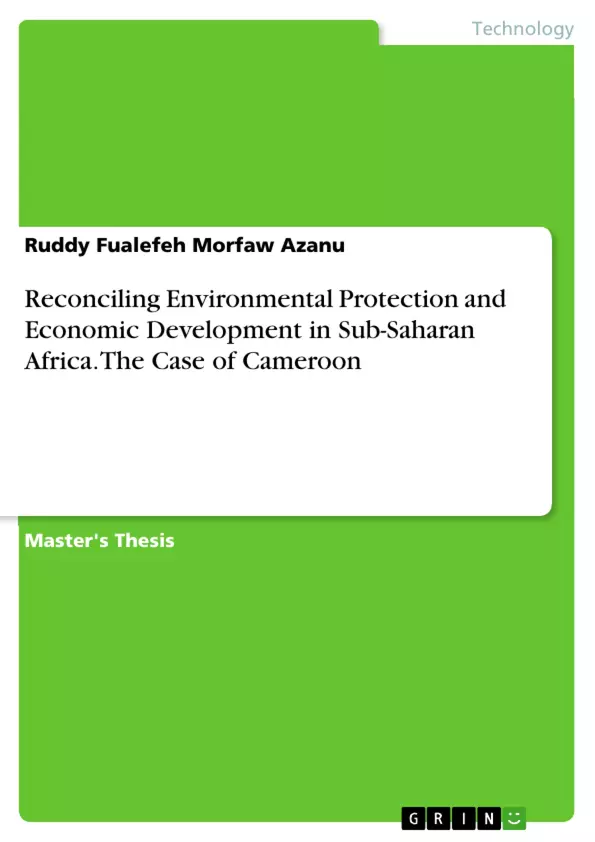This work has engaged in refining current understandings of the possibilities for attaining environmental conservation objectives amidst the incessant struggle for economic advancement in Sub-Saharan Africa (SSA). It has examined the inability of the region to properly assimilate sustainable developmental tenets as reflected in the weaknesses of the several legislations that exist. The analysis was done through the concept of the respect for the Rule of Law and considered all relevant factors in terms of structural and administrative changes as well as reflected needs of the region, using Cameroon as a case study. Through the doctrinal research approach, it demonstrated in theory, the correlation between environmental protection and economic development. Looking at the legal, policy and institutional frameworks for environmental protection within SSA and Cameroon, it has examined the effect of the several legislations on business and trade, and therefore the overall upshot on economic development. The work has consequently scrutinized the possibility of reconciling environment and economic needs through green growth and a green economy. Amidst these difficulties associated with the concept of sustainable development, the question was therefore contemplated whether the pressing international calls for the restriction of the use of Africa’s resources could be tantamount to a disguised neo-colonialist move by former imperialist nations to retard the region’s advancement. The findings of the work therefore revealed outweighing difficulties associated with presently attaining green growth within the region and how its efforts continually stifle economic growth and development. The weaknesses inherently associated with the concept of sustainable development, which are strongly reflected in the prevailing African situation established some misgivings about the good-faith propagated by the ‘rich North’ towards the ‘poor South’. The work therefore suggested that the region should properly weigh its needs and goals in the light of the environment and the economy, and not rush into commitments it cannot live up to. To achieve this, it would have to integrate the opinions of all stakeholders into the decision-making process, from public to private and to individual levels.
Inhaltsverzeichnis (Table of Contents)
- Introduction
- Literature Review
- Conceptual Framework
- Sustainable Development
- Environmental Protection
- Economic Development
- Legal Framework for Environmental Protection and Economic Development in Cameroon
- The Legal Framework for Environmental Protection in Cameroon
- The Legal Framework for Economic Development in Cameroon
- Challenges to Reconciling Environmental Protection and Economic Development in Cameroon
- Poverty and Unemployment
- Deforestation and Biodiversity Loss
- Pollution and Climate Change
- Strategies for Reconciling Environmental Protection and Economic Development in Cameroon
- Integrated Development Planning
- Environmental Impact Assessment
- Public Awareness and Education
- Conclusion
Zielsetzung und Themenschwerpunkte (Objectives and Key Themes)
The primary objective of this thesis is to analyze the challenges and opportunities associated with reconciling environmental protection and economic development in Cameroon. The study examines the existing legal framework, identifies key challenges, and proposes strategies for achieving a sustainable balance between these competing priorities.
- Environmental Protection and Economic Development
- Sustainable Development
- Legal Framework in Cameroon
- Challenges and Opportunities
- Strategies for Reconciliation
Zusammenfassung der Kapitel (Chapter Summaries)
The Introduction sets the context for the thesis, highlighting the importance of environmental protection and economic development in Sub-Saharan Africa. The Literature Review examines existing scholarship on environmental protection, economic development, and the challenges of reconciling these two objectives. The Conceptual Framework defines key concepts such as sustainable development, environmental protection, and economic development. The legal framework chapter analyzes relevant legislation and policies governing environmental protection and economic development in Cameroon. The chapter on challenges examines factors hindering the reconciliation of environmental protection and economic development, including poverty, deforestation, and pollution. Finally, the chapter on strategies proposes potential solutions for achieving a sustainable balance, including integrated development planning, environmental impact assessments, and public awareness campaigns.
Schlüsselwörter (Keywords)
Key terms and concepts covered in this thesis include environmental protection, economic development, sustainable development, legal framework, Cameroon, Sub-Saharan Africa, challenges, strategies, integrated development planning, environmental impact assessment, public awareness, and reconciliation.
Frequently Asked Questions
Can environmental protection and economic growth coexist in Cameroon?
The thesis explores this possibility through the concepts of green growth and a green economy, highlighting both legal frameworks and practical challenges.
What are the main challenges to sustainable development in Cameroon?
Key challenges include high poverty and unemployment rates, deforestation, biodiversity loss, and the impact of climate change.
How does the legal framework affect business and the environment?
The analysis shows that while legislations exist, their weaknesses often hinder the assimilation of sustainable developmental tenets in trade and industry.
Is environmental restriction a form of 'neo-colonialism'?
The work contemplates whether international calls to restrict Africa's resource use might be a move by former imperialist nations to retard the region's advancement.
What strategies are proposed for a sustainable balance?
Proposed strategies include integrated development planning, environmental impact assessments, and increasing public awareness and education.
- Citar trabajo
- Ruddy Fualefeh Morfaw Azanu (Autor), 2018, Reconciling Environmental Protection and Economic Development in Sub-Saharan Africa. The Case of Cameroon, Múnich, GRIN Verlag, https://www.grin.com/document/457524



